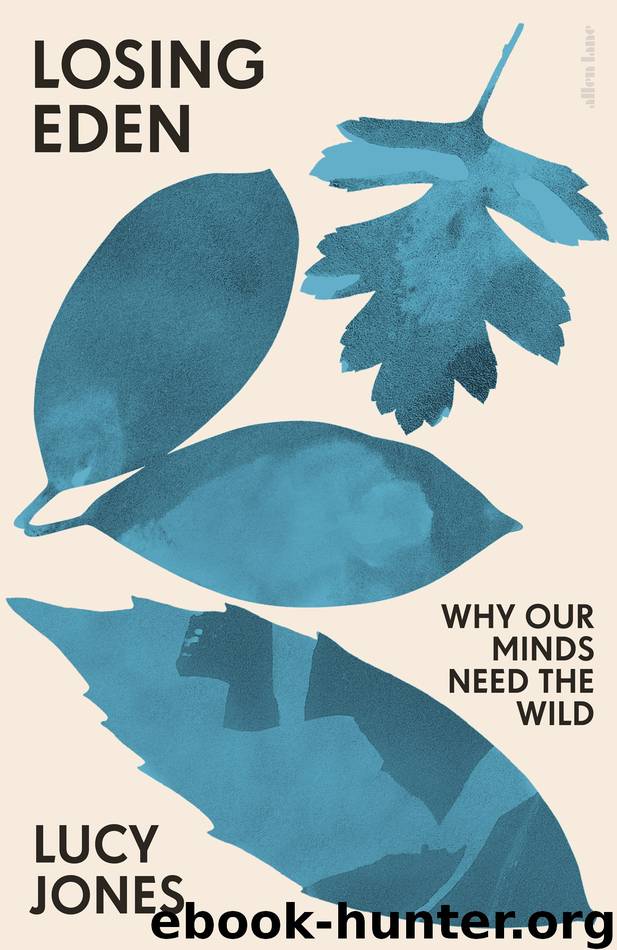Losing Eden by Lucy Jones

Author:Lucy Jones
Language: eng
Format: epub
ISBN: 9780241441541
Publisher: Penguin Books Ltd
Published: 2020-03-25T16:00:00+00:00
7.
Ecological Grief
monachopsis, noun. The subtle but persistent feeling of being out of place, as maladapted to your surroundings as a seal on a beach.
The word ‘ecology’ comes from the Greek oikos, meaning ‘household’, ‘home’ or ‘place to live’.
It is all very well thinking about how more connection with the natural world would make people happier and healthier. But there is a problem. How can forest medicine be prescribed when forests are threatened and diminishing across the world? How can people spend time in green spaces when the numbers of parks are declining? How do you have a relationship with somebody who is terminally ill? First, in Western and industrialized society worldwide, we are becoming disconnected from the natural world and overlooking how much we need it. Second, and of course this is related, that natural world is rapidly vanishing; our time on this Earth is haunted by the violent destruction of natural habitats and the extinction of species. Add in the unpredictable and frightening reality of climate breakdown and how it is already leading to the decimation of species, our own included, and our relationship with nature, even if it could be restored, isn’t quite as simple as the soothing, serene, Thoreauesque ramble in the wild. The wild barely exists. What is the effect of biodiversity loss on our minds, our inner selves, and the collective psyche? Are we, as a collective, harmed by biological annihilation? As the landscape of the Earth changes, how is the landscape of our mind affected? When George, a tree snail and the final member of the Achatinella apexfulva species, died on 1 January 2019, did it have an emotional impact that goes further than the scientists that studied him? How do we grieve for the Earth?
*
One of the most poignant but sadly inevitable words to have gained currency in the twenty-first century is ‘endling’. In the mid-1990s, Robert Webster, a doctor in Georgia, USA, wanted to find a word to describe a patient of his, who was the last surviving member of his family. After a while, he came up with ‘endling’ and sent it to Merriam-Webster for inclusion in the dictionary. He was told that it needed to be used in print a number of times before it could be included. First, he bought an advert in the back pages of a medical journal. Then, he wrote to the ‘Letter’ pages of Nature and a discussion ensued with some suggested alternatives (‘ender’ or ‘terminarch’, because ‘endling’ sounded too ‘pathetic’), but the word was essentially shrugged off.1
In 2001, the National Museum of Australia in Sydney resurrected the word, but used it in a different way. ‘Endling’ appeared in an exhibition to describe the thylacine, a carnivorous marsupial which looks like a cross between a wolf and a tiger, which was hunted to extinction on the island of Tasmania in the 1930s. Artists of all kinds were inspired by the word and cultural responses that followed included a chamber orchestra composition, science fiction novels, a
Download
This site does not store any files on its server. We only index and link to content provided by other sites. Please contact the content providers to delete copyright contents if any and email us, we'll remove relevant links or contents immediately.
The Lonely City by Olivia Laing(4120)
Animal Frequency by Melissa Alvarez(3755)
All Creatures Great and Small by James Herriot(3517)
Walking by Henry David Thoreau(3234)
Exit West by Mohsin Hamid(3184)
Origin Story: A Big History of Everything by David Christian(3139)
COSMOS by Carl Sagan(2950)
How to Read Water: Clues and Patterns from Puddles to the Sea (Natural Navigation) by Tristan Gooley(2855)
Hedgerow by John Wright(2777)
The Inner Life of Animals by Peter Wohlleben(2767)
Origin Story by David Christian(2684)
How to Read Nature by Tristan Gooley(2666)
Project Animal Farm: An Accidental Journey into the Secret World of Farming and the Truth About Our Food by Sonia Faruqi(2661)
How to Do Nothing by Jenny Odell(2645)
A Forest Journey by John Perlin(2588)
Water by Ian Miller(2584)
The Plant Messiah by Carlos Magdalena(2454)
A Wilder Time by William E. Glassley(2364)
Forests: A Very Short Introduction by Jaboury Ghazoul(2335)
